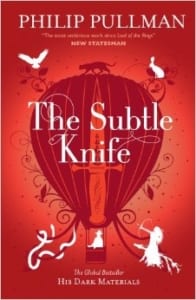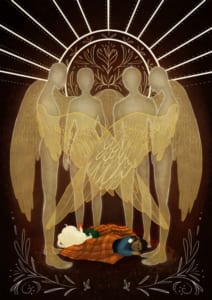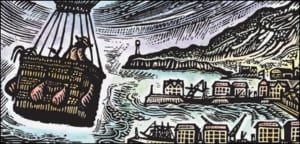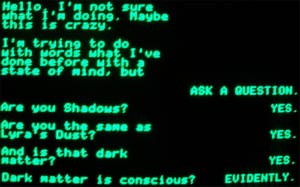The middle chapters of trilogies are classically the hardest to say anything intelligent about. They’re a bridge between the opening chapter, which introduces us to new characters and worlds, and the closing chapter, where the story and the character arc all culminate. The middle chapter, though, can sometimes sag. We don’t have novelty, and we don’t have the excitement of the climax. (The exception to this is The Empire Strikes Back, which is novel and exciting if only because it’s so damn good.)

His Dark Materials’s middle chapter, The Subtle Knife, by Philip Pullman suffers from many of these problems. It’s much less of a contained story than Northern Lights, which was really about Lyra on a journey of personal and spiritual actualization. There’s is a lot of tension building up to something, but even the ending we have is only there because that end was necessary so our protagonists could have a beginning.
The being said, there are new places and people. Most importantly there is Will Parry, the Adam to Lyra’s Eve. There are so many of these new characters, as well as minor characters who have an expanded role, that poor Lyra ends up a little sidelined. The narrative gives her plenty of room for growth, but it’s still a bit of a shock after an entire book focused on her so heavily. The third-person objective narration remains the same, but the author’s voice seems willing to be behind far more eyes for longer than previously, especially now that Will in on the scene as Lyra’s equal.
Will is Lyra’s opposite in many ways. He comes from a literal different universe (our universe, in fact, or close enough,) but also from a different universe of experience. While Lyra lived a life of privilege and near obliviousness, Will’s childhood was spent with the responsibility of caring for his mentally ill mother and protecting her enemies, both real and imagined. His resilience is remarkable, even if he shrugs off manslaughter a little too easily. (Which I’m quite sure is a feature, not a bug.)
Despite their differences, the bond between the two children is immediate, to the point that Lyra’s daemon Pan touches Will to comfort him, breaking the greatest taboo of their world. Will helps her navigate a new universe despite his natural skepticism of strangers, and Lyra gets over her selfishness in order to dedicate herself entirely to helping him, not knowing that doing so brings her closer to her own Magical Destiny.

Will’s Magical Destiny is, again like Lyra’s, tied to his parentage. In his case, it’s a lifelong vague feeling that he must find his missing father and “take up his mantle.” And both of their fathers are rather mysterious figures, with secret knowledge not entirely understood by the children or by the reader.
Lord Asriel, Lyra’s father, was last seen walking into the sky after murdering a child to make a hole in space-time (it makes sense in context, I swear). Now we hear about him gathering an army to kill god, (it makes sen—never mind,) in the literal centre of the universe(s), but any sense of him we had as a man is long gone.
As for the Shaman known alternately as John Parry, Jonpari, or Stanislaus Grumman, his knowledge is even more mysterious than Lord Asriel’s long-planned deicide. Will’s father is a wizard who can control the weather and somehow acquired a daemon of his own. He also knows enough about the great War Against the Authority that he reacts with appropriate horror when he realizes the role his own son has to play in it. How he got this knowledge, though, is not at all clear to me. And I doubt I’ll get any answers now that John’s story seems to be over. The only explanation I really have is that this is knowledge he was given by the indigenous people of the north. (Call “Tartars” in Lyra’s world.) But that’s a little too Dances with Wolves for me.
There are also several characters whose roles are greatly expanded from the first volume, as the scope broadens. The Witch Queen Serafina Pekkala is the reader’s eyes and ears for a good deal of the book as we explore the consequences of the events of the last volume on Lyra’s world, and explore a dangerous new one, full of soul-eating creatures called Spectres, the results of a previous naive attempt to bridge the worlds.
Much the same function is served by Lee Scoresby, a minor character from Northern Lights. He and his daemon, Hester, are easily the best character in this volume. (Will comes close.) He’s the kind of salt-of-the-earth character that is often attempted, but rarely works as well as this. His gruff exterior and proclamations that he “just a simple aeronaut trying to make a living” hides a man who is completely selfless. He knows what he has to do (because Magical Destiny again) and he does it without regard to himself. Because he loves Lyra like a daughter. The end of his story in the penultimate chapter is one of several moments in this novel that made me cry.

Another new character is Doctor Mary Malone, a research physicist whose grant is about to run out (horror of horrors). She also has a role to play, though what that might be is barely even hinted at in this volume. She is clearly one of the many who are meant to help Lyra and Will to whatever their goal is, and she may prove to be as expendable as the others.
That theme, that some people are expendable for a greater good, is one that has carried over from the first volume. That was the argument of the Church when it made the General Oblation Board after-all, that it’s just to sacrifice some for the right cause. And somehow the people who do the deciding are never those who suffer. Imagine that.
Mrs. Coulter continues her streak of being absolutely horrifying. She borders on both omniscience and omnipotence, and her cold-heartedness is breathtaking. So is her fanatical devotion to the Authority and preventing another fall, even at the cost of her own daughter. It’s a little unclear to me how much of a true believer she could be, and how much she is motivated by almost unimaginable ambition. To be honest, though, it would be hard to imagine a more effective evil dictator.
Pullman builds Mrs. Coulter as a villain by having her triumph over the lesser villains of the story. She can control the terrifying soul eating Specters, by all appearances just by force of will, with the same aplomb that she manipulates, and then dispatches, Lord Boreal, the man who caused Will and Lyra so much trouble in our world, and who own knowledge and power seem too much for them to overcome.
The knowledge that I’ve been alluding to several characters having is what makes this series a little difficult to categorize in terms of the Science Fiction vs. Fantasy paradigm.

Dust is a spiritual concept made physical, doing for the soul what the brain does for the mind. The way it connects humans to angels, and therefore to god, makes it both incomprehensible (How can dark matter, the stuff that makes gravity weird, also be the seat of consciousness? How does that work?) and puts god and his realm firmly within the scope of our understanding. And it’s a good thing too, since everyone’s Magical Destinies are all steering then towards a war to destroy the very barely comprehensible source of that consciousness, an overly-controlling, cruel parent unwilling to let his children grow up.

